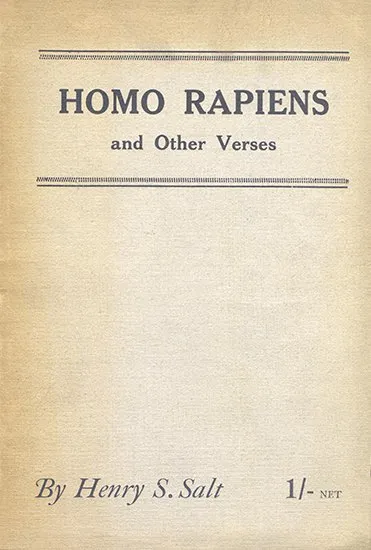
Homo Rapiens and Other Verses
Henry S. Salt
- Publisher: Watts & Co., London
- Published: 1926
- Length: 70 pages
- Format: Paperback
Summary
In Homo Rapiens, Henry S. Salt challenges humanity’s self-congratulatory label of “Homo Sapiens”—the wise—proposing instead “Homo Rapiens,” the predator. With sharp wit and moral clarity, Salt critiques the cruelty and exploitation that underpin modern society. From vivisectors and fox-hunters to meat-eaters and profiteers, Salt takes aim at those who, under the guise of tradition or enterprise, perpetuate suffering on both animals and fellow humans.
Salt’s humour is his sharpest weapon, used to expose hypocrisy and moral blind spots. Far from adopting a detached superiority, Salt’s satire stems from his deep compassion, as the Times Literary Supplement notes: his “stinging humour” cuts through “self-interested and predatory hypocrisy” while remaining free of personal bitterness. Nowhere is this more evident than in his poem The Deer Departed: A Sportsman’s Elegy, where Salt brilliantly turns the hunter’s own lament on its head with a biting finale:
“I could not love thee, Deer, so much,
Loved I not Hunting more.”
Salt’s verses, including the sardonic Magna est Feritas, mock the glorification of brute force while exposing the contradictions that underpin our so-called civilisation. His humour is not only a tool to condemn but also to provoke reflection on our own role in a world shaped by violence and exploitation.
Central to Salt’s critique are the themes of Socialism and Vegetarianism, which he believes are essential for human progress. His incisive wit is matched by his ability to turn the arguments of his critics back on themselves, making his moral message both powerful and humorous. Homo Rapiens is a sharp, witty condemnation of modern man’s predatory nature, and a call for a more compassionate future.
NOTES
I. THE BRUTALITARIAN
Homo Rapiens — The Making of the Brute — St. Grouse’s Day — Cupboard Love’s Philosophy — Rapiens Evolving — The Cherub Child — To Metchnikoff, the Civilizer — The Gentleman in Pink — The Pious Angler — A Sympathetic Lady — A Ballad of the Tender — “Set Up” — The True Museum — Rapiens as Botanist — From a Pagan Poet — “Family Butchers” — “A Lover of Animals” — The Show of Fat Beasts — The Faddist Rebuked — The Sending of the Animals — The Modern Descartes — Mr. Facing-Both-Ways — The Altruistic Flesh-Eater — The City of the Might-Have-Been — The Grateful Fox to His Preservers — The Deer Departed: A Sportsman’s Elegy — The Cage Bird’s Paradise — Patient to Practitioner — The Much-Chastened Child — The Modern Xerxes — Concerning “Die-Hards” — Ode to Duty and Discipline — “Fraternizing” — The Unknown Warrior
II. TALKS WITH TOMNODDY
Invocation — The Land o’ the Free — “On the Dole” — “Those Unemployed!” — “Ca’ Canny” — “The Deserving Poor” — Which Was It? — Moscow as Mascot — The Difference — Fuel for Prospero — Our Fatherlandlords — “Class-War” — “An Independence” — The Grand Incentive — The Socialist Monotony — The Agitator — The “Plus” and the “Minus” — Par Ignoble Fratrum — The Sin of Subsidy — Dieu et mon Dividende — No Thought for the Morrow — The Missing Word — Epitaph on Laissez Faire
III. RUSTY SAWS RE-SHARPENED
Provocation — Heart and Head — “Magna est Feritas” — The War on War — Si Vis Pacem Para Bellum — “Que Messieurs les Assassins y Commencent” — “Spare the Rod and Spoil the Child” — De Fustibus — A Text to Let Alone — The Birch Tree’s Petition — The Dictum of the Duke — The Marshal’s Baton — The Family Man in Battle — “What’s in a Name?” — “Dumb Animals” — “He” and “It” — “Love Me, Love My Dog” — Christianos ad Leones — The Monarch’s Portion — The Democratic Formula — “With One Stone” — “A Bird in the Hand” — The Open Mouth — The Full Heart — A Supper-Room Reflection — Self-Help — Yuletide Joys — “Pink Pills for Pale People” — Gentleman into Ox — The Forgiving Lamb — The Appeal to Peter — “As Dead as Mutton” — “Better Free than Sober” — Trespassers will be Prosecuted — Medio Tutissimus Ibis — “The Falsehood of Extremes” — “Take Things as You Find Them” — “The Treasures of Antiquity” — Our “Securities” — “Peace at any Price” — Love Your Enemies
Reviews
- Homo Rapiens The Vegetarian News, December 1926
- Homo Rapiens and Other Verses Times Literary Supplement, December 23, 1926
- Homo Rapiens and Other Verses The Socialist Review, February 1927




